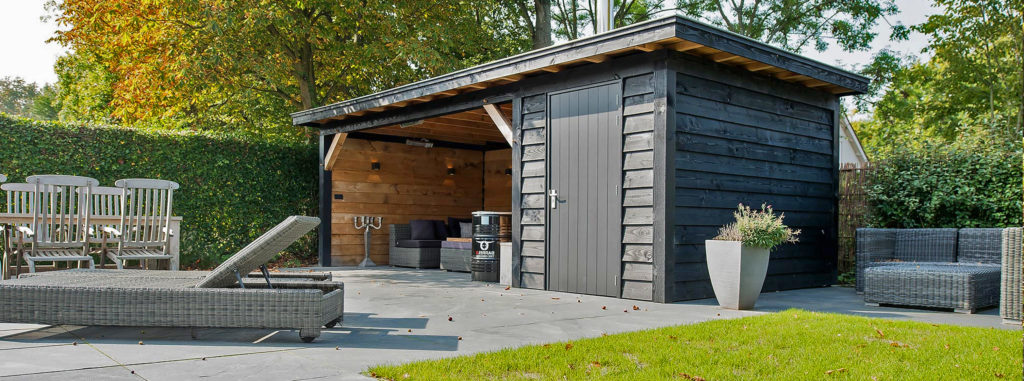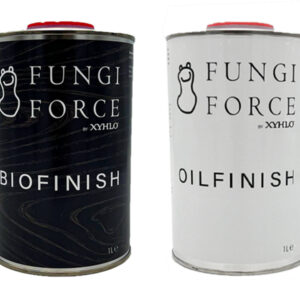Garden shed, impregnating or staining?
You have just placed a new garden house in your garden or want to buy a garden house and you wonder, will I impregnate or stain it. We tell you the difference and what the best choice is for the environment and the people around you.
Why impregnating or staining?
Most garden houses and log cabins are made of soft wood such as pine or spruce. This wood is very sensitive to the effects of the weather and UV radiation from the sun. If you do not protect your garden house or log cabin against this, the wood will be replaced after 5 years. Reason enough to treat the wood, extend the life and have longer enjoyment of your garden house. But do you choose impregnation or stain? And what about the maintenance and the environment?
Impregnating or staining is not the right question
The question of whether you have to impregnate or pickle is actually not a correctly formulated question. Because impregnation alone is not enough, because it is not a final finish. Impregnation is only treatment against wood rot, fungi and vermin. That is why it is necessary to pick up your impregnated garden house or log cabin after installation. It does not matter whether the garden house was already impregnated at the factory or that you did it yourself. In the latter case, ensure sufficient protection when applying the impregnation agent.
Is impregnation and staining advisable?
Impregnated wood is unfortunately not so good for the environment and even dangerous for people. It is poisonous and contains carcinogenic substances such as copper II oxide, chromium trioxide and arsenic. It’s for good reason that impregnated wood always needs to be treated with chemical waste. And burning in eg stove, fire pit or fireplace is out of the question. Then many toxic substances will end up directly in our environment. We strongly advise impregnation and subsequent staining of the garden house or log cabin. Pay attention when purchasing your garden house or log cabin, often these are already pre-impregnated.
Only pickling and not impregnating?
It is better to pick up your garden house or log cabin only and not impregnate it. This is possible with untreated garden houses. Pay attention to this when purchasing. The surface of the garden house to be stained must be free of grease before you can start. This is usually the case with a new garden house. Otherwise, a thorough cleaning and degreasing of the garden house are necessary. To allow the stain to adhere better, some sanding of the wood is desirable and subsequent dusting with, for example, a normal household dustpan. With a traditional stain, you have to repeat this process every 2 to 5 years.
Do you want to be environmentally friendly? Then keep in mind that almost all stains – including the water-based stains – still contain a lot of chemicals, metal salts and/or biocides. These are added for better adhesion, faster drying and the elimination of harmful fungi. The more durable the stain makes the wood, the more chemicals are added to the stain. Of course, all these additions are not good for the environment and our health. It is not for nothing that normal stain should also be placed with small chemical waste. Fortunately, there is an alternative. A 100% natural stain without chemicals that can be used in the kitchen waste box after use. Moreover, this natural stain requires less maintenance.
Alternative for staining and impregnation?
There is a very good eco-friendly alternative for impregnating and staining wood. This alternative is Fungi Force. This is a 100% natural bio-based on a harmless fungus and natural linseed oil. Fungi Force can be applied on untreated wood with a paint roller or a block brush. Within an hour you have completely treated a conventional garden house. And applying too much biofinish or oilfinish is not a problem. You will not see that later. Another important advantage of FF compared to normal stain is its long-term effect. Maintenance takes place once a year or every two years, depending on the exposure of your garden house or log cabin to the elements. After-treatment with natural linseed oil is then sufficient.
Fungi Force, black bio stain
Fungi Force is the first fully organic and 100% environmentally friendly black stain. It gives the wood a beautiful natural matt black transparent cover and it offers a 100% environmentally friendly protection of garden wood. Fungi Force is very durable and protects garden houses, log cabins and other garden wood for many years. The bio stain is easy to apply to untreated wood, requires little maintenance and is self-repairing in case of minor damage. Read more about how Fungi Force works?
So if you want to stain your fence, garden shed or garden furniture black, think about the environment and the health and use Fungi Force.


